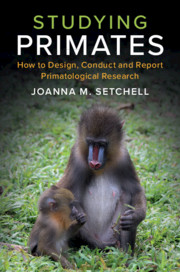'In this invaluable book, Professor Joanna M. Setchell presents an exceptionally comprehensive and highly accessible guide to the study of primates. The text offers a detailed description of every aspect of the planning, execution and presentation of a primatological research study. In addition to scientific guidance and coverage of key conceptual ideas, crucial practical advice about the realities and challenges of research are provided. Furthermore, Setchell explores a range of issues that are so critical to consider fully in modern science, among them cultural sensitivity, ethics, research integrity and inclusivity. To my mind, this is an essential text for any student of primatology; it will be top of the reading list for every course I teach in this area.'
Stuart Semple - University of Roehampton
'A landmark book covering everything a modern primatologist needs to know, including research design and execution, ethics, field methods, conservation politics, and writing up for journals and the public. It is a complete encyclopedia describing the modern complexities of studying our closest relatives. The book advises how to negotiate and deal with political and ethical issues from village to university. In addition, it links basic research with conservation agendas in a unified and mutually reinforcing way. The final chapter gives convincing arguments for why primatology is relevant, even essential to understanding modern-day life and science. At long last a volume that will give students and professors a road map of solutions to real world problems of conducting research. Thorough, rigorous and compelling, this is a must-read for all primatology graduate students and seasoned scientists. I recommend it all to anthropologists, primatologists, biologists, and environmental and social scientists working in field research.'
Patricia C. Wright - State University of New York, Stony Brook
'This book is timely, highly needed and very welcome. It introduces basic principles and rules of scientific inquiry - from devising research questions to preparing research results for publication, always considering ethical issues - and tackles these issues from a taxon-specific, namely primatological perspective. This approach makes the book much more accessible for students at all levels of training and for young scientists than more general and abstract introductions to scientific practice. Throughout all chapters, the book transpires Joanna M. Setchell's broad experience as a researcher and author, and as an editor for the International Journal of Primatology. Despite the primate-focused approach, I am convinced that this book will not only be very useful to students of primatology, but also to scholars from other taxon-specific and organism-centered biological disciplines, such as mammalogy or ornithology.'
Eckhard W. Heymann - Deutsches Primatenzentrum, Germany
‘… all essential topics are thoroughly covered in one volume and applied especially to the study of primates … This volume is indispensable for those teaching and engaging in primatological research.’
L. K. Sheeran
Source: Choice
‘Setchell has provided a timely, nicely executed, and valuable book that we should embrace regardless of how long we have been in the business - and that can yield several benefits to our research and teaching missions … this book makes a fantastic graduation gift for undergraduates considering graduate school or postgraduates wrapping up their degree … this volume pushes us to reflect and improve, helping us and our students get farther and, it is my hope, to more interesting places.’
Mitchell T. Irwin
Source: The Quarterly Review of Biology
‘Whatever background brought you to primatology and wherever you want to study primates- indeed whichever primates you want to study- this book will be an extremely useful guide… It should be essential reading for graduate/post-graduate students. I am sure more seasoned researchers will not only learn something but also find it very useful for teaching and mentoring.'
Anna T. C. Feistner
Source: The Primate Eye



